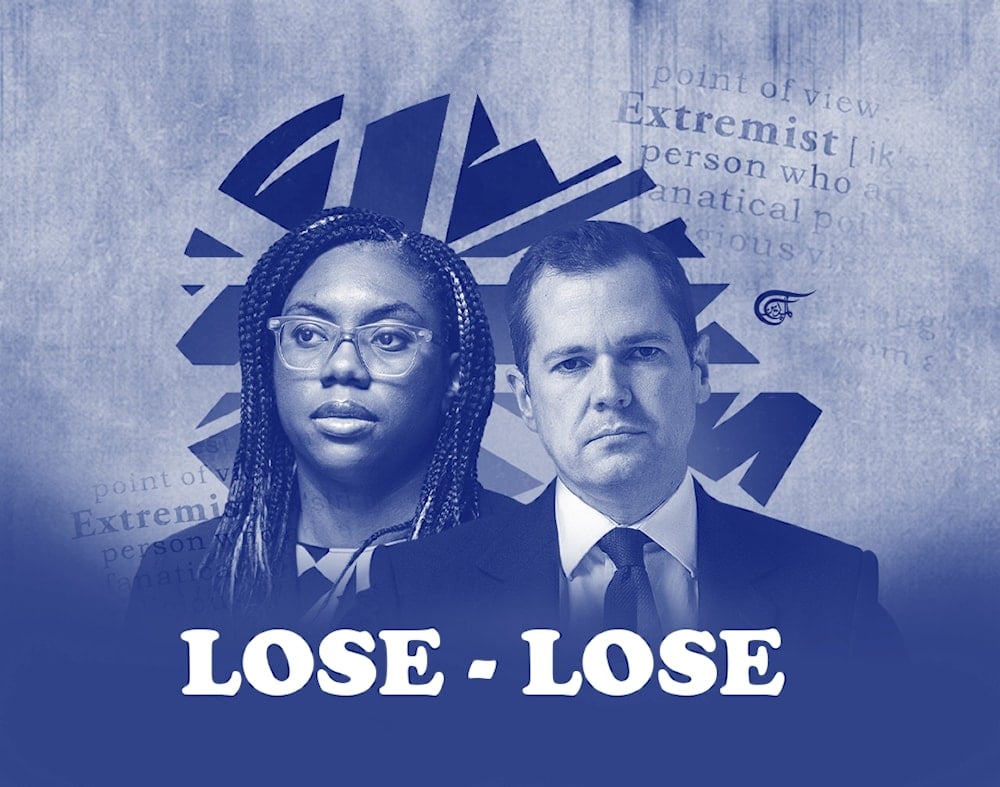News from Nowhere: And the loser Is…
As the new leader of the Conservative Party, Kemi Badenoch isn’t in truth a winner so much as a survivor. She simply looks like the one who was just the last to lose.
-

Congratulations, Ms. Badenoch. And commiserations too. And – despite your often awfully reactionary perspectives – (grudgingly) good luck. (Al Mayadeen English; Illustrated by Zeinab el-Hajj)
When the final two candidates in the UK Conservative Party leadership race were announced, one Labour parliamentarian commented that this was such a big gift to her own party that she wondered whether they’d have to declare it in the register of members’ interests.
Through a series of votes, Tory MPs had whittled down a range of candidates who'd represented the broad spectrum of Conservative politics down to the two most rabid right-wingers on offer. Given that those MPs themselves represented that broad spectrum, it wasn’t immediately clear why they’d done this.
Some supposed that they were all so wrapped up in their fears of the threat posed to traditional Conservatism by Nigel Farage’s Reform UK Party that they’d seemed to have forgotten that it was a centrist incarnation of the Labour Party and the ever-centrist Liberal Democrats who’d trounced them at the general election in July, reducing them to their worst ever result at a national poll.
Others noted that quite a few Tory MPs secretly admired Mr. Farage’s radical right-wing views and had chosen candidates they thought most likely to emulate his brand of populist nationalism.
A number of commentators reasoned that the former frontrunner James Cleverly – a candidate to the center-right of the party, seen by many as someone who might almost manage to unite the Conservatives’ feuding factions – had been discarded by the irrational logic of internecine hatred, when those Tory MPs desperate to kick one of the two remaining radical right-wing candidates off the ballot had voted for the other one (instead of for Mr. Cleverly), and those violently opposed to that other one had voted for the first one (again, instead of Mr. Cleverly).
Indeed, it has been rumored that Cleverly himself persuaded some of his own supporters to vote for one of his rivals in a bid to knock the more popular contestant out of the race. It was reported that he'd got the famously useless Grant Shapps (a man who’d served as Home Secretary for less than a week) to work the numbers for him. This turned out not to be his smartest move. Cleverly by name, perhaps, but not by nature.
In the end, then, when the choice of the final two was put to the grassroots members of their party, the surviving nominees for the Conservative leadership included a former junior minister for immigration called Robert Jenrick – an overgrown schoolboy who looks like he wants to eat all the pies and who saddled his own daughter with the middle name “Thatcher”.
The other remaining candidate was only very slightly less unimpressive: a former Business Secretary called Kemi Badenoch – a true blue zealot with a crocodile smile and (in the style of her erstwhile premier Liz Truss) slightly crazy eyes. This right-of-right ideologue has previously been accused of bullying and of reducing members of her staff to tears.
Ms. Badenoch has certainly for some time looked pretty much bad enough to lead the so-called ‘nasty party’.
Their erstwhile rival, Mr. Cleverly had distinguished himself during the latter stages of the leadership campaign with a barnstorming speech at his party’s conference, when he’d suggested they might try being a bit more “normal” for a change – and by virtue of the fact that he had recently served as Home Secretary, and before that as Foreign Secretary, two of Whitehall’s great offices of state.
By contrast, Ms. Badenoch had hit the headlines when she’d thought it a good idea to suggest that allowances for paid maternity leave were excessive and that 10 per cent of civil servants were so bad at their jobs they should be in prison.
Meanwhile, her main competition hadn’t exactly distinguished himself. Mr. Jenrick had barely prompted a ripple of public or press interest, even when he appeared to propose the closure of many of the country’s universities – an argument later advanced, even more vociferously, by Ms. Badenoch, who declared that her colleagues hadn’t gone far enough in acting on their anti-education rhetoric.
With typically provocative pettiness, Jenrick had claimed that human rights laws were getting in the way of what he saw as the mission of British special forces to kill as many terrorists as possible (a statement condemned as an insanely inflammatory falsehood by his critics). But even this minor controversy was soon overtaken by an overwhelming wave of indifference generated by his extraordinary lack of personality and long-term policy commitments – other than an avowed desire to send asylum-seekers to Africa and to abandon the UK’s alignment with internationally recognized frameworks and norms.
That’s not to suggest that his rival was any clearer on her policy positions. In fact, when he declared that her refusal to set out such details was “disrespectful” to their party’s members, she responded that “if this was a general election, it would be wrong to be standing with no policies” – but that this was “not a general election”.
The increasingly bitter tone of this vacuous contest was no doubt why that Labour MP had been able to find solace in the news that the Conservatives were about to choose a leader whose ideological extremism didn’t appear to be balanced by their personal charisma or a capacity for basic common sense.
Indeed, even as the Labour Party continues to sink in the opinion polls – following a harsh Budget and scandals surrounding various expensive gifts received by their most senior members – its strategists will no doubt relish the prospect of facing an Opposition led by the gaffe-prone Kemi Badenoch.
For, as Mr. Jenrick proves to be the bigger loser of the two and slinks back into political obscurity, there’s not much of a sense of victory for anyone at all.
As the new leader of the Conservative Party, Kemi Badenoch isn’t in truth a winner so much as a survivor. She simply looks like the one – now burdened with the poisoned chalice of the leadership of her party’s smallest ever number of MPs – who was just the last to lose.
But as the Tories lurch even further to the right to become their version of Reform Lite, the biggest loser in all this is of course the British electorate, stuck with an Opposition which can heckle and hate but which seems unable to work constructively to hold to account a new administration whose massive parliamentary majority sometimes seems to make Keir Starmer’s front bench believe they can act in all aspects of government without impunity or challenge.
So, congratulations, Ms. Badenoch. And commiserations too. And – despite your often awfully reactionary perspectives – (grudgingly) good luck.
Because, for parliamentary democracy to work, we need an effective Opposition. And because – even given the meteoric collapse of the current UK government’s popularity – you’re really going to need it.

 Alex Roberts
Alex Roberts
 7 Min Read
7 Min Read











